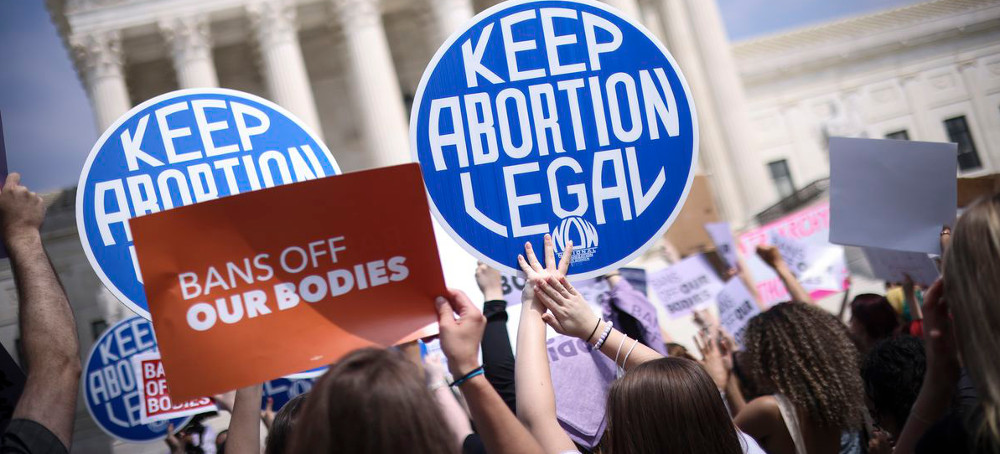 Anti-abortion and pro-abortion rights activists
demonstrate in front of the US Supreme Court Building on May 3, 2022,
in Washington, DC. (photo: Win McNamee/Getty)
Anti-abortion and pro-abortion rights activists
demonstrate in front of the US Supreme Court Building on May 3, 2022,
in Washington, DC. (photo: Win McNamee/Getty)
ALSO SEE: Ruth Ben-Ghiat | Lucid (Substack)
Shaming Women and Denying their Personhood by Removing Reproductive Rights Has a Long, Disgusting History
In an authoritarian state, women are as much the enemies of the strongman as the press, prosecutors, and the opposition. We can correlate the appeal of strongmen to moments when men feel their status is threatened due to changes in gender roles and distributions of economic and social power.
Control over female bodies in the name of population growth is a throughline of authoritarianism, as are persecutions of LGBTQ+ individuals. Anti-colonial leaders such as Mobutu Sese Seko and Idi Amin were just as misogynist and homophobic as their racist imperialist peers. And autocratic bans on abortion span the political spectrum, as the awful outcomes of such policies in Communist despot Nicolae Ceausescu’s Romania show.
In Europe and America, the century-long focus of the far right on demographic emergencies supposedly created by declines of White births and upticks in non-White immigration have created support for controls on female bodies. These controls are predicated on negating the personhood of women and consigning them to roles as vessels of population growth.
For men to preserve their “natural” right to dominate, and White Christian civilization to continue, women must be deprived of reproductive rights and demeaned, disciplined, and criminalized if they resist.
This larger frame of authoritarian gender politics is key for understanding the assaults on abortion rights that are making news today, as in the new ban on abortion in Arizona that has no exceptions for rape or incest.
Misogyny can be expressed as a desire to distress and shame women who seek to exercise reproductive rights. That’s why in Viktor Orban’s Hungary, where abortion rights have been increasingly restricted, a 2022 law requires a woman seeking an abortion to listen to the heartbeat of her fetus.
When Matt Schlapp, the head of the Republican Conservative Political Action Conference, cited the decline of the White race in 2022 as a primary justification for a federal abortion ban, he echoed authoritarian views of women as tools of biopolitics. “If you’re worried about this quote-unquote ‘replacement,’ why don’t we start…with allowing our own people to live?”
This position makes women race killers as well as baby killers, which is why Schlapp considers the Supreme Court’s overturning of Roe v. Wade as “a good start” to a larger civilizational battle.
From Fascist Italy forward, abortion bans have opened the door to criminalizing women and monitoring their movements, as today’s Republican push for laws against women traveling out of state for abortions show. Rollbacks of reproductive rights are also an important way that autocrats get support from extremist religious institutions.
Trumpism continues this war on women. It started in 2015 as a movement against a multiracial and progressive America, fueled by racism and anxieties about male authority and status. It evolved into a presidency with a gender politics that should make us skeptical of Trump’s claim that he would not sign a federal abortion ban if he returns to office.
During President Barack Obama's two terms in office, gender had been an important barometer of social progress. In 2013, the U.S. military committed to implementing full gender integration. In 2015, same-sex marriage became legal in all fifty states, and in 2016, transgender individuals were allowed to serve in the U.S. military.
All of this was targeted when Trump, a serial sexual assaulter, came into office after a campaign that normalized death threats against his female opponent, Hillary Clinton. Reclaiming male authority after the Obama era meant creating an environment in which men could act on their desires to control and harm women and pay fewer or no consequences.
To model the new political culture, Trump repeatedly appointed and defended men accused of sexual harassment or domestic abuse. In 2019, the Department of Justice’s Office of Violence Against Women changed the definition of domestic violence, limiting it to physical acts of harm. The DOJ no longer considered “sexual, emotional, economic, or psychological actions or threats of actions that influence another person,” as “felony or misdemeanor crimes.”
This was the context for the bans and restrictions on abortion that occurredin Georgia, Kentucky and other states during Trump’s presidency. They have continued in Alabama, Arkansas, and elsewhere as Republicans have moved even further to the right and made common cause with Orban and other autocrats with similar policies.
We can keep this larger history in mind and mobilize accordingly, knowing that restricting reproductive rights is unpopular among Americans. A 2022 AP poll found that 61% of Arizona voters felt abortion should remain legal in most or all cases; only 6% wanted it banned. We can support campaigns for state amendments to reverse these laws, and back statehouse candidateswho run against extremists.
And we can talk about the adverse physical, financial and psychological outcomes of the removal of reproductive rights with family and acquaintances who follow Trump and watch Fox News. Do they really want to see the women they love criminalized, even in cases of rape?
As Dahlia Lithwick and Mark Joseph Stern write in Slate of the ban in Arizona, “The decision should serve as a warning for the rest of the country…In the hands of a far-right court, a dead, openly misogynistic, wildly unpopular abortion ban can spring back to life with a vengeance.”
Not to mention the difference in respect for women.








No comments:
Post a Comment